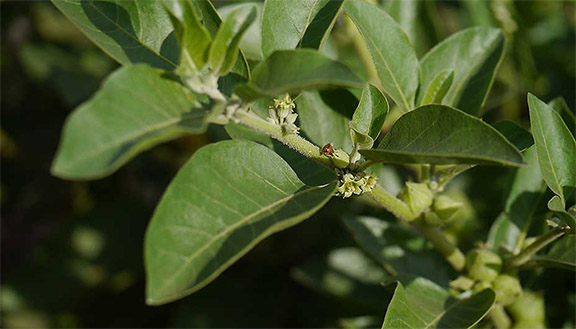Science & Technology
‘Ashwagandha’ in Covid-19 Recovery
- 02 Aug 2021
- 4 min read
Why in News
Recently, India and the UK have collaborated to conduct a study on ‘Ashwagandha (AG)’ for promoting recovery from Covid-19.
- After the trial’s success, ‘Ashwagandha’ will be a proven medicinal treatment to prevent infection and be recognised by the scientific community worldwide.
- This is the first time that the Ministry of Ayush has collaborated with a foreign institution to investigate its efficacy on Covid-19 patients.
Key Points
- About Ashwagandha:
- Ashwagandha (Withania somnifera) is a medicinal herb. It is reputed as an immunity enhancer.
- It is classified as an adaptogen, which means that it can help the body to manage stress.
- Ashwagandha also boosts brain function and lowers blood sugar and helps fight symptoms of anxiety and depression.
- Ashwagandha has shown clinical success in treating both acute and chronic rheumatoid arthritis.
- Rheumatoid arthritis (RA) is an autoimmune disease that can cause joint pain and damage throughout your body.
- An autoimmune disease is a condition in which your immune system mistakenly attacks your body.
- Potential of Ashwagandha:
- The study suggests Ashwagandha as a potential therapeutic candidate for alleviating the long-term symptoms of Covid-19.
- Recently, a number of randomised placebo-controlled trials of AG in humans in India had demonstrated its efficacy in reducing anxiety and stress, improving muscle strength and reducing symptoms of fatigue in patients treated for chronic conditions.
- A randomized controlled trial is a prospective, comparative, quantitative study/experiment performed under controlled conditions with random allocation of interventions to comparison groups.
- Clinical Trials:
- Clinical trials in humans are classified into three phases: phase I, phase II and phase III and in certain countries formal regulatory approval is required to undertake any of these studies.
- The phase I clinical studies carry out initial testing of a vaccine in small numbers (e.g. 20) of healthy adults, to test the properties of a vaccine, its tolerability, and, if appropriate, clinical laboratory and pharmacological parameters. Phase I studies are primarily concerned with safety.
- Phase II studies involve larger numbers of subjects and are intended to provide preliminary information about a vaccine’s ability to produce its desired effect (usually immunogenicity) in the target population and its general safety.
- Extensive phase III trials are required to fully assess the protective efficacy and safety of a vaccine. The phase III clinical trial is the pivotal study on which the decision on whether to grant the licence is based and sufficient data have to be obtained to demonstrate that a new product is safe and effective for the purpose intended.
- Clinical trials in humans are classified into three phases: phase I, phase II and phase III and in certain countries formal regulatory approval is required to undertake any of these studies.







